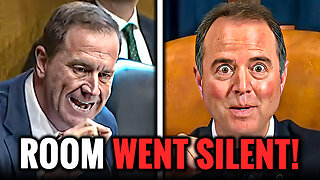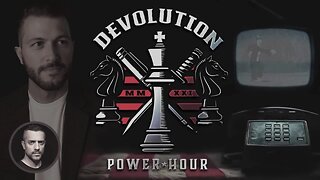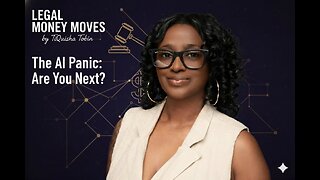Premium Only Content

The Black Mirror plot about AI that worries actors - BBC
🥇 Bonuses, Promotions, and the Best Online Casino Reviews you can trust: https://bit.ly/BigFunCasinoGame
The Black Mirror plot about AI that worries actors - BBC
Image source, Alamy Image caption, Salma Hayek discovers she signed away the rights to her AI likeness in a recent episode of Black Mirror By Shiona McCallum Technology reporter Hollywood actors are striking for the first time in 43 years, bringing the American movie and television business to a halt, partly over fears about the impact of artificial intelligence (AI). The Screen Actors Guild (SAG-AFTRA) actors' union failed to reach an agreement in the US for better protections against AI for its members - and warned that "artificial intelligence poses an existential threat to creative professions" as it prepared to dig in over the issue. Duncan Crabtree-Ireland, the chief negotiator for the SAG-AFTRA union, criticised producers for their proposals over AI so far. He said studios had asked for the ability to scan the faces of background artists for the payment of one day's work, and then be able to own and use their likeness "for the rest of eternity, in any project they want, with no consent and no compensation". If that sounds like the plot of an episode of Charlie Brooker's Black Mirror, that's because it is. US media has been quick to point out that the recent series six episode "Joan Is Awful" sees Hollywood star Salma Hayek grapple with the discovery that her AI likeness can by used by a production company without her knowledge. Image source, Getty Images Image caption, Harrison Ford was de-aged using computer technology, including machine learning, in the most recent Indiana Jones film And it's not just SAG-AFTRA who are concerned about so-called "performance cloning". Liam Budd, of UK acting union Equity, said: "We're seeing this technology used in a range of things like automated audiobooks, synthesised voiceover work, digital avatars for corporate videos, or also the role of deepfakes that are being used in films." Mr Budd said that there was "fear circulating" amongst the Equity members and the union was trying to educate them on understanding their rights in this fast-evolving world. Film-maker and writer Justine Bateman, speaking to the BBC's Tech Life earlier this year, said that she did not think the entertainment industry needed AI at all. "Tech should solve a problem and there's no problem that those using AI solves. We don't have a lack of writers, we don't have a lack of actors, we don't have a lack of film-makers - so we don't need AI," she said. "The problem it solves is for the corporations that feel they don't have wide enough profit margins - because if you can eliminate the overhead of having to pay everyone you can appease Wall Street and have greater earnings reports. "If AI use proliferates, the entertainment industry it will crater the entire structure of this business." Perhaps it is only a question of time before ChatGPT or Bard can conjure up an innovative movie script or turn an idea into a blockbuster screenplay. Media caption, Watch: Brian Cox: 'I am concerned about artificial intelligence' Some say AI will always lack the humanity that makes a film script great, but there are legitimate concerns that it will put writers out of a job. The Writers' Guild of Great Britain (WGGB) - a trade union representing writers for TV, film, theatre, books and video games in the UK - has several concerns, including: AI developers are using writers' work without their permission and infringing writers' copyright AI tools do not properly identify where AI has been used to create content Increased AI use will lead to fewer job opportunities for writers The use of AI will suppress writers' pay AI will dilute the contributions made by the creative industry to the UK economy and national identity. The WGGB has made a number or recommendations to help protect writers, including AI developers only using writers' work if they have been given express permission and AI developers being transparent about what data is being used to train their tools. WGGB deputy general secretary Lesley Gannon said, "As with any new technology we need to weigh the risks against the benefits and ensure that the speed of development does not outpace or derail the protections that writers and the wider creative workforce rely upon to make a living. "Regulation is clearly needed to safeguard workers' rights, and protect audiences from fraud and misinformation." Medi...
-
 1:28
1:28
Damon Imani
1 day agoThey Laughed at Trump’s Cognitive Test — Damon Made Them REGRET It!
9.06K6 -
 9:14
9:14
Freedom Frontline
22 hours agoAdam Schiff PANICS As Eric Schmitt Exposes His Dirty Lies LIVE
6.17K4 -
 10:32
10:32
GBGunsRumble
1 day agoGBGuns Armory Ep 153 Adler Arms AD-9`
5.47K2 -
 35:53
35:53
Degenerate Plays
3 hours ago $0.09 earnedRuckus Randy And Repair Ronald (Socks On) - Call of Duty: Modern Warfare 2 (2009) : Part 7
3.42K1 -
 38:35
38:35
Stephen Gardner
23 hours ago🔥What JUST leaked out of Congress. PROVES Trump RIGHT!!
95.2K128 -
 LIVE
LIVE
Total Horse Channel
15 hours ago2025 IRCHA Derby & Horse Show - November 2nd
61 watching -
 1:59:42
1:59:42
Game On!
21 hours ago $44.71 earnedNFL Week 9 Wise Guy Roundtable BEST BETS!
145K15 -
 2:18:53
2:18:53
Badlands Media
22 hours agoDevolution Power Hour Ep. 403: Brennan Exposed & The Intel War w/ Thomas Speciale
465K139 -
 4:34
4:34
Legal Money Moves
5 days agoThe AI Panic: Are You Next?
53K10 -
 25:41
25:41
Robbi On The Record
3 days ago $46.89 earnedThe Billion-Dollar Lie Behind OnlyFans “Empowerment” (Her Testimony Will Shock You) | part II
76.2K72